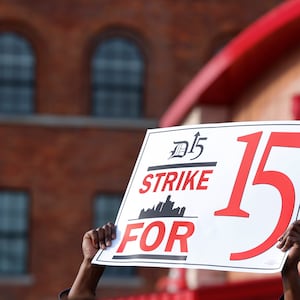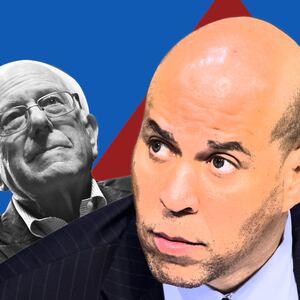LAWRENCE, Massachusetts—Against the faded brick facade of the Everett Mill, Sen. Elizabeth Warren (D-MA) officially began her presidential bid this past weekend. And she did so by looking backwards.
Warren told a story of collective action, of workers uniting behind common goals and bridging language and ethnicity barriers for the sake of fair wages, overtime pay, and the right to join a union. She spoke at the site of the famous “Bread and Roses” strike, which was led by textile workers on a cold January day in 1912 and stretched into March. Addressing a crowd of 3,500 on a blustery day where the wind occasionally rattled a large American flag draped over rusting metal, the senator drew parallels from that moment to the one confronting the country currently.
“The story of Lawrence is a story about how real change happens in America,” Warren told the attendees, who occasionally dotted the crisp air with “WIN WITH WARREN” signs. “It’s a story about power—our power—when we fight together.”
ADVERTISEMENT
“Today, millions and millions and millions of American families are also struggling to survive in a system that has been rigged by the wealthy and the well-connected.”
Warren’s explicit appeal to labor, both symbolically and in policy terms, was a natural play for a Democrat seeking the nomination for the presidency. But it also underscored a unique challenge facing all Democrats in 2019. Three years after President Donald Trump made inroads among white working class voters and union households, the party is still trying to find the perfect formula to prevent it from happening again.
“More and more Democrats understand that’s the core of our party: the workers,” Sen. Sherrod Brown (D-OH), a prospective presidential candidate, told The Daily Beast on Saturday night at an event in New Hampshire. “I don’t know if it’s a commentary on ‘16, but it’s a commentary on the history of our party and who we need to be.”
Brown, who has been visiting early primary states on a “Dignity of Work” tour, said that he wanted to ensure that the presidential field kept its focus on workers in their messaging and policy prescriptions. He and others have been heartened by the success of teachers’ strikes across the nation. And they’ve taken note of how voters in typically conservative states like Missouri overwhelmingly rejected right-to-work laws and how progressive, worker-focused policies proved successful in recent statewide results in the Midwest, including the Fight for $15 minimum wage movement playing a role in toppling Republican governors.
But despite that progress, some union officials remain wary of the fact that Hillary Clinton underperformed President Obama among union members in 2016, according to exit polling from the AFL-CIO, the largest federation of unions in the country. If Trump is to be unseated in the upcoming election, prevailing wisdom goes, it will most likely be because that underperformance doesn’t happen again.
"If you run for president without placing unionism front and center, you do so at your own political peril," said an AFL-CIO official.
In order to ensure that there is no 2016 repeat, the AFL-CIO has begun running a more robust political program with increased member-to-member communication, which officials there view as an effective way to mobilize voters. There is also skepticism that members will be supportive of Trump to the same degree given his legislative agenda thus far which has included a tax cut for large corporations.
“Let’s have a 22-month discussion about what’s at stake for working families, what a disgrace the Trump presidency has been and who’s really on their side, fighting for them,” Steve Rosenthal, former political director for the AFL-CIO, told The Daily Beast. “We went through several elections where the candidates wouldn’t use the ‘u’ word,” he added, noting that gubernatorial candidate and potential Senate aspirant Stacey Abrams talked about unions and spoke from a union hall for her State of the Union response. “It’s becoming part of the foundation of Democratic campaigns in this election."
With regards to the 2020 field, unions have a wealth of options. In addition to Warren, the group of Democratic candidates could feature Brown, Sen. Bernie Sanders (I-VT), who earned the support of many local labor unions in 2016, and a host of other senators who have moved steadily left in recent years.
“The more the merrier in my book,” Steve Tolman, president of the Massachusetts AFL-CIO, who was in attendance on Saturday, told The Daily Beast. “It’s time for America to elect somebody who is on par with FDR,” he said in a Boston accent that turned the New Dealer into FD-Ahhhw. “It seems that the right-wing special interest money wants to roll back everything that FDR created.”
Given how early it is in the primary process, the major national unions have not put forth specific prerequisites for 2020 support. Officials said they are watching the process unfold before making a determination of who best speaks to the labor movement. But they are already issuing warnings.
“Ultimately, we will endorse the candidate whose platform and record indicates they have the best interests of working people at the top of their agenda,” Nicole Korkolis, communications director for the Office and Professional Employees International Union, told The Daily Beast.
Asked whether that would be more of a challenge given the broad array of candidates that will ultimately be in the race, she said: “Not harder or more challenging, just means we have to listen more and listen to what our members are telling us to find the candidate who will best represent the interests of working people.”
A presidential endorsement from the national AFL-CIO requires a two-thirds vote from the general board, which includes executive council members, allied organizations and representatives of the state federations. The federation typically waits to formally back anyone until the nominee is essentially set, with the exception of previously backing Walter Mondale and Al Gore before their primaries were completed. In 2016, the AFL-CIO supported Clinton but when they conducted exit polls on how their members voted in the presidential election, they saw a nine percentage point drop among active and retired members from the level of support Obama had. That decline, union officials say, is what could have contributed to the narrow margins of victory for Trump in Midwestern states.
“It was much more of a drop off in enthusiasm for Clinton than it was a big shift of union voters from Obama to Trump,” Thea Lee, former deputy chief of staff for the AFL-CIO, told The Daily Beast.
Democrats have spent the better part of two years trying to pinpoint exactly why that drop off occurred, with Lee and others mentioning Obama’s push for the Trans-Pacific Partnership trade deal and Clinton’s lack of barnstorming in the those Midwest states as likely contributors.
Trump built much of his campaign on maligning past trade agreements and the way they impacted workers in the Midwest. And he specifically targeted white working class voters by tying Clinton to her husband and NAFTA.
But union officials say Trump’s pitch seems to have faded and his hold on that voting bloc seems to have cracked, as evidenced by midterm results that saw Democrats gaining the governorships, House seats and holding Senate seats in the Midwest states that have often comprised the so-called Blue Wall. With those voters seemingly up for grabs in 2020, Democrats have made a concerted effort to speak the language of labor, talking more about disadvantaged workers, income inequality, wealth gaps and health care. Warren has advocated for allowing workers to elect at least 40 percent of board members for corporations with over $1 billion in revenue. Sanders has gone directly after Amazon and Walmart, successfully pushing the former company to raise wages for workers. Brown wants to eliminate incentives for offshoring for corporations that emerged as a byproduct of the recent GOP tax bill. And they’ve all talked about the importance of unions in restoring the middle class.
“To me the ultimate progressive invention in a lot of respects is a union,” Pennsylvania’s Lieutenant Governor John Fetterman told The Daily Beast. He was on a ticket in 2018 with incumbent Governor Tom Wolf that won by 17 points in a state that Trump narrowly carried in 2016. The Pennsylvania Republican gubernatorial ticket had endorsed right-to-work laws and Fetterman said that the defense of organized labor played a big role in the success of their campaign.
“People forget how revolutionary the whole concept of a union is,” he said. “I think it’s the distillate of the progressive argument in America.”







